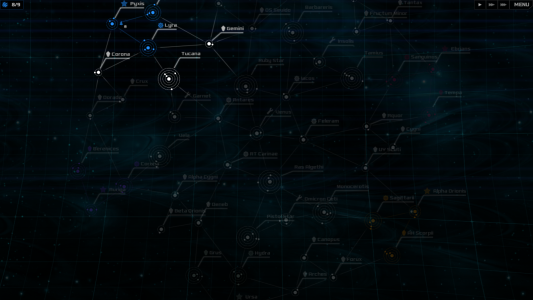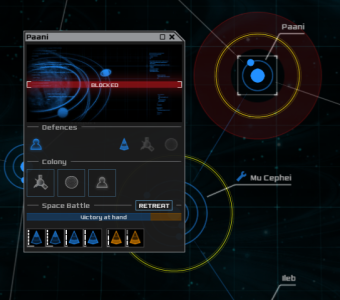SpaceCom, a new real time strategy game developed by Flow Combine and published by 11 Bit Launchpad releases on Steam this week. I had the chance to get an early look at the game and its safe to say that the game will not disappoint fans of, or newcomers to, the strategy genre.
What is SpaceCom?
Flow Combine describes SpaceCom as “a strategic-to-the-bone, starfleet command game with a heavy focus on multiplayer. Spacecom is a battle of strategists in which deception, smart movement, and choices to battle decide victory or defeat. No coincidence, no luck. Spacecom pushes your ability to strategize with a focus on real-time tactics and planning. Use proven maneuvers learned from military legends or devise your own plans.” My experience with the game has shown their description to be quite apt. Unlike many games in the genre Spacecom does not rely on deep technology trees or a large number of available units with a complex system of each unit countering another. Instead, there are only three units in the game: Battle Fleets, which are focused on fighting other fleets, Invasion Fleets, which are used to capture planets and expand your empire, and Siege Fleets, which can be used to destroy a planet, making it unusable to your enemy, but also yourself. Similarly, there are only two planetary upgrades: Battle Stations, which defend your planet from attack, and Kinetic Shields, which shield your defense from damage and slow your attackers. The thing about SpaceCom that makes it feel very different from other real time strategy games is that the outcome of a battle is, with little exception, is known as soon as the fight commences. The only randomness in the game comes from what fleet receives damage first. On its face this may seem like it makes the game boring, but instead it makes the strategic aspect of the game even more important. Rather than mechanical skill determining the victor, such as in a game of StarCraft or League of Legends, the situations you have created, the decisions you have made, and how you react to your opponents is the only thing that matters. Some extra depth is added through an experience system that makes fleets that have been victorious in the past more adept at combat in the future. Because planets that can repair damage ships are relatively sparsely placed, this makes deciding when to push veteran ships forward vesus taking the time to bring them back for repairs an important one.
Gameplay
SpaceCom was designed with multiplayer in mind, so the single player campaign serves as little more than a tutorial. It does its job very well, introducing the units and the concepts of the game mission by mission. It also ramps up the difficulty at just the right pace, making sure you aren’t tempted to skip the rest of the missions and jump into meat of the game before you’ve learned how the game works. For those wanting more practice there is also a skirmish mode where you can play AI who range in skill from trivial to expert. Games range from two to six players and the size of the map ranges from suitably tiny for an intense duel to large enough for to allow you and the other five players room to expand before encountering each other.

Multiplayer also works quite well, allowing you to play with a mix of human and AI players. The game also tracks your skill rating and assigns you military styled ranks based on it. Games play out relatively quickly compared to other strategy games, especially on smaller maps.
Graphics and Sound
When Flow Combine described the game as bared boned, they are not kidding. The game plays out on a 2D map quite reminiscent of DEFCON and units are represented by triangles. Different sections of the triangle being colored in indicates the type of fleet. Battles are not accompanied by flashy visuals of massive starships blowing each other up either. Instead they quietly play out in a popout screen that shows each ship’s health and when each ship is firing. This leaves you undistracted and able to focus on the big picture.

The music and sound effects for the game are similarly minimal. Combat does not provide any sounds of laser blasts, missile explosions, or anything at all in fact. The background music for the game is quiet and relatively even in tone, again to distract the player as little as possible. This game was quite obviously designed for the focused tactician rather than the audiophile.
Conclusion
SpaceCom is a highly entertaining game that was incredibly easy to get in to, but shows promise as being difficult to master. Its focus on pure strategy and bare-bones mechanics above all else makes it relatively unique in the genre and it suits the game quite well, however those looking for a bit more depth may be disappointed.

